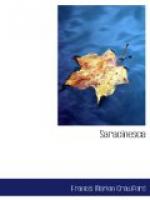“I daresay,” answered the Prince, who was always pleased when his son expressed a desire for his company. “I wish we lived in the good old times.”
“Why?”
“We would make small scruple of besieging Astrardente and carrying off the Duchessa for you, my boy,” said the Prince, grimly.
Giovanni laughed. Perhaps the same idea had crossed his mind. He was not quite sure whether it was respectful to Corona to think of carrying her off in the way his father suggested; but there was a curious flavour of possibility in the suggestion, coming as it did from a man whose grandfather might have done such a thing, and whose great-grandfather was said to have done it. So strong are the instincts of barbaric domination in races where the traditions of violence exist in an unbroken chain, that both father and son smiled at the idea as if it were quite natural, although Giovanni had only the previous day promised that he would not even attempt to see Corona d’Astrardente without her permission. He did not tell his father of his promise, however, for his more delicate instinct made him sure that though he had acted rightly, his father would laugh at his scruples, and tell him that women liked to be wooed roughly.
Meanwhile Giovanni felt that Rome had become for him a vast solitude, and the smile soon faded from his face at the thought that he must go out into the world, and for Corona’s sake act as though nothing had happened.
CHAPTER XX.
Poor Madame Mayer was in great anxiety of mind. She had not a great amount of pride, but she made up for it by a plentiful endowment of vanity, in which she suffered acutely. She was a good-natured woman enough, and by nature she was not vindictive; but she could not help being jealous, for she was in love. She felt how Giovanni every day evidently cared less and less for her society, and how, on the other hand, Del Ferice was quietly assuring his position, so that people already began to whisper that he had a chance of becoming her husband. She did not dislike Del Ferice; he was a convenient man of the world, whom she always found ready to help her when she needed help. But by dint of making use of him, she was beginning to feel in some way bound to consider him as an element in her life, and she did not like the position. The letter he had written her was of the kind a man might write to the woman he loved; it bordered upon the familiar, even while the writer expressed himself in terms of exaggerated respect. Perhaps if Del Ferice had been well, she would have simply taken no notice of what he had written, and would not even have sent an answer; but she had not the heart to repulse him altogether in his present condition. There was a phrase cunningly introduced and ambiguously worded, which seemed to mean that he had come by his wound in her cause. He spoke of having suffered and of still suffering so much




